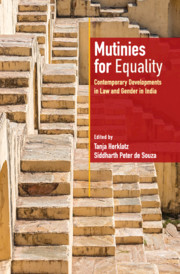13 - Turning to the State: Between Processing Disputes and Protecting Autonomy
Published online by Cambridge University Press: 08 June 2021
Summary
Introduction
In urban societies in India marked by complex and large social relationships, community mediation still finds space as an alternative to or in conjunction with adversarial forms of dispute processing in state fora. Studies have shown that a preference for conciliatory mechanisms of dispute processing is more prominent in family disputes which are marked by relationships that still largely exist in the context of community structures that are closely knit and cohesive in nature with a considerable degree of interdependence. Individuals in such social structures are engaged in ‘ongoing relationships which they are interested to preserve’. Mediation is popularly also deemed as an appropriate mechanism in such contexts because family structures in India continue to exist within structures of ‘shared values’ which allow the possibility to engage in a discussion with a potential for success.
For mediation to be successful, however, Merry argued that it was also necessary that the mediators must operate ‘in terms of a shared value system’. This can often be challenging in urban neighbourhoods that are fragmented and scattered. Slum neighbourhoods comprise one form of urban neighbourhood in Indian society. They have diverse compositions in terms of religion, caste, class, political identities and socio-economic status. Many of these are rampant with development initiatives introduced both by the government and non-governmental agencies, which add another layer of values to the frameworks within which individuals in these neighbourhoods operate. In order to further or strengthen their hold within the slum communities, mediation of the community's disputes is often undertaken by such agencies as incidental to the other development programmes within these slums.
This chapter explores the functioning of a non-governmental organisation (NGO)–run family dispute counselling centre located in an urban slum in the city of Pune to understand how such fora process disputes while navigating the various normative frameworks within which they function. Active in neighbourhoods already constituted of various normative layers, the presence of a dispute processing centre not only adds another layer of norms, but must confront a set of specific expectations peculiar to the context. The extent to and manner in which these expectations are fulfilled, in turn, leads the way for establishing the legitimacy of such a centre within the broader locale.
Information
- Type
- Chapter
- Information
- Mutinies for EqualityContemporary Developments in Law and Gender in India, pp. 242 - 257Publisher: Cambridge University PressPrint publication year: 2021
Accessibility standard: Unknown
- 1
- Cited by
